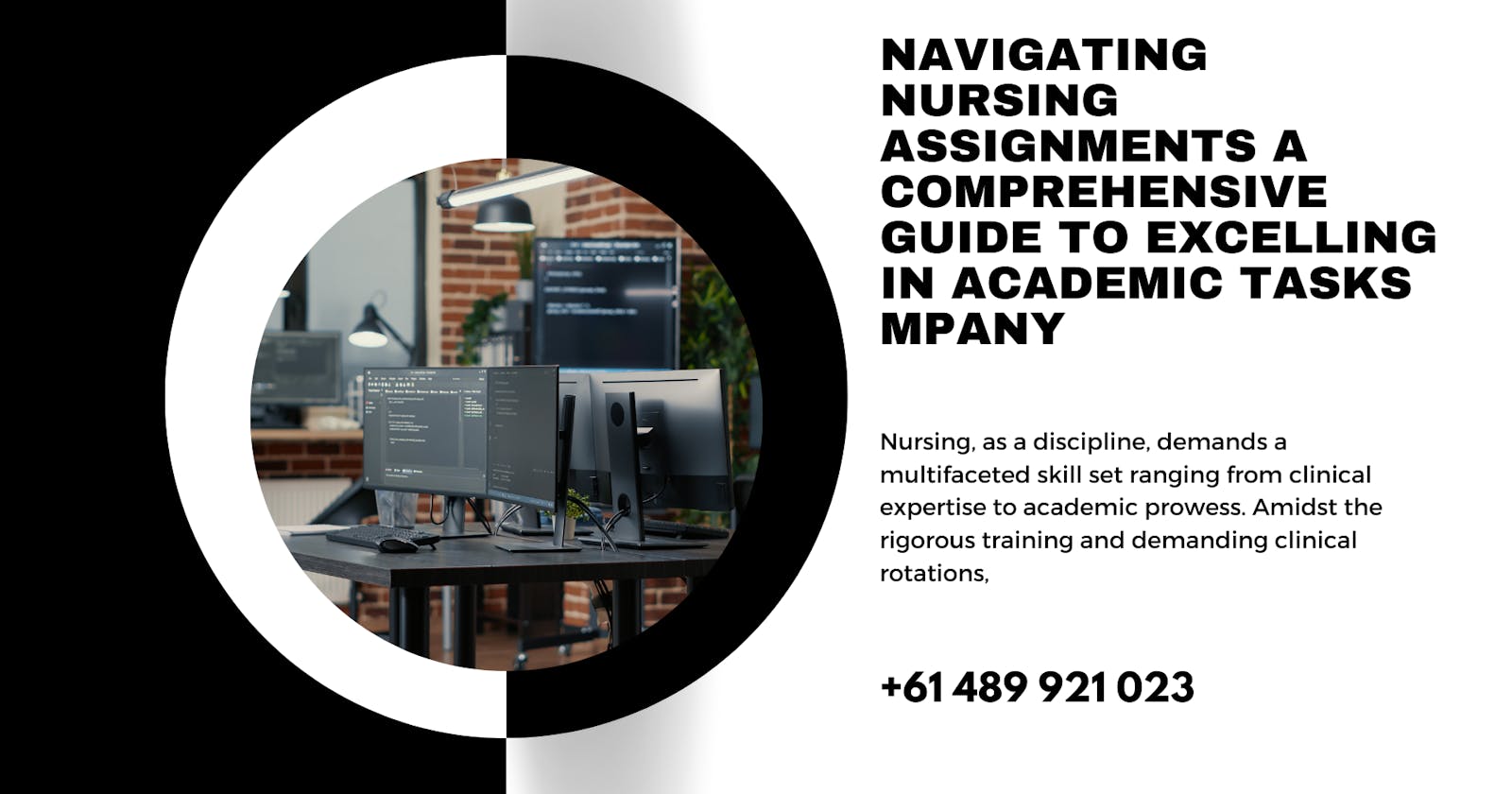Navigating Nursing Assignments A Comprehensive Guide to Excelling in Academic Tasks
Nursing, as a discipline, demands a multifaceted skill set ranging from clinical expertise to academic prowess. Amidst the rigorous training and demanding clinical rotations, nursing students are often tasked with numerous assignments, essays, case studies, and research papers. These assignments serve as vital components in their academic journey, providing opportunities to deepen understanding, apply theoretical knowledge to practical scenarios, and enhance critical thinking skills. However, navigating through nursing assignment help can be challenging, especially for those juggling clinical responsibilities, coursework, and personal commitments. In this comprehensive guide, we will explore strategies, tips, and resources to excel in nursing assignments effectively.
Understanding the Essence of Nursing Assignments
Nursing assignment are not merely academic exercises but integral components of nursing education designed to achieve specific learning outcomes. These assignments are crafted to assess various competencies essential for nursing practice, including critical thinking, communication skills, evidence-based practice, and clinical reasoning. They come in diverse formats such as essays, case studies, care plans, reflective journals, research papers, and presentations, each serving distinct purposes in fostering holistic development and professional growth.
Key Components of Nursing Assignments
Critical Analysis: Nursing assignments often require students to critically analyze clinical scenarios, research findings, or healthcare policies. This involves evaluating information, identifying key issues, exploring different perspectives, and drawing evidence-based conclusions. Developing critical analysis skills is fundamental for effective problem-solving and decision-making in nursing practice.
Evidence-Based Practice (EBP): EBP is the cornerstone of modern nursing, emphasizing the integration of best available evidence with clinical expertise and patient preferences. Nursing assignments frequently involve applying EBP principles to address clinical dilemmas, develop care plans, or critique research studies. Understanding the hierarchy of evidence, conducting literature reviews, and appraising research articles are crucial skills in this domain.
Communication: Effective communication is essential in nursing practice for conveying information, collaborating with interprofessional teams, and advocating for patients. Nursing assignments often assess communication skills through written reports, oral presentations, or interdisciplinary collaborations. Clear and concise communication, tailored to diverse audiences, is paramount for successful completion of assignments.
Clinical Reasoning: Nursing assignment help simulate real-world scenarios, challenging students to apply theoretical knowledge to clinical practice. This entails synthesizing assessment data, formulating nursing diagnoses, planning interventions, and evaluating outcomes. Developing clinical reasoning skills through case studies, care plans, and simulations prepares students for the complexities of patient care.
Strategies for Excelling in Nursing Assignments
Start Early: Procrastination can be detrimental when tackling nursing assignments. Start early to allow ample time for research, drafting, revisions, and seeking feedback. Break down tasks into manageable chunks and create a realistic timeline to stay on track.
Understand the Assignment: Carefully read the assignment prompt to grasp its requirements, expectations, and evaluation criteria. Identify key components such as the purpose, audience, format, and scope of the assignment. If unsure, seek clarification from instructors to ensure clarity.
Conduct Thorough Research: Utilize credible sources such as peer-reviewed journals, textbooks, clinical guidelines, and reputable websites to gather information. Take notes, cite references accurately, and critically evaluate the quality and relevance of sources. Organize research findings systematically to facilitate synthesis and integration into the assignment.
Utilize EBP Principles: Incorporate evidence-based practice principles into assignments by critically appraising research articles, synthesizing evidence, and applying findings to clinical scenarios. Use frameworks such as PICOT (Population, Intervention, Comparison, Outcome, Timeframe) or PICO (Population, Intervention, Comparison, Outcome) to formulate clinical questions and guide evidence synthesis.
Engage in Reflective Practice: Reflective assignments offer opportunities for self-assessment, introspection, and professional growth. Reflect on clinical experiences, challenges encountered, lessons learned, and areas for improvement. Incorporate relevant theories, models, or frameworks to deepen reflection and enhance learning outcomes.
Seek Feedback: Actively seek feedback from peers, instructors, or mentors throughout the assignment process. Solicit constructive criticism to identify strengths and areas needing improvement. Incorporate feedback into revisions to refine the quality and coherence of the assignment.
Use Writing Resources: Enhance writing skills by utilizing resources such as writing centers, style guides, grammar checkers, and citation management tools. Pay attention to clarity, coherence, organization, and adherence to APA (American Psychological Association) or other specified formatting guidelines.
Collaborate with Peers: Collaborative learning fosters peer support, knowledge exchange, and diverse perspectives. Engage in group discussions, study sessions, or peer review activities to brainstorm ideas, share insights, and enhance understanding of assignment topics.
Practice Time Management: Efficient time management is essential for balancing academic responsibilities, clinical duties, and personal commitments. Prioritize tasks, set realistic goals, and allocate sufficient time for each stage of the assignment process. Avoid overcommitting and learn to delegate tasks when necessary.
Maintain Balance: Nursing education can be demanding, but it's crucial to maintain a balance between academic pursuits, clinical experiences, self-care, and personal interests. Prioritize self-care activities, engage in hobbies, and seek support from friends, family, or support networks to prevent burnout and promote overall well-being.
Conclusion:
Navigating nursing assignment help Australia requires a blend of academic proficiency, clinical acumen, and professional integrity. By understanding the essence of nursing assignments, developing key competencies, and implementing effective strategies, students can excel in academic tasks while preparing for the complexities of nursing practice. Embrace challenges as opportunities for growth, cultivate a spirit of lifelong learning, and strive for excellence in all facets of nursing education and practice.

